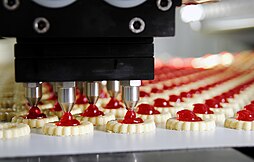
Semester:III
Course duration: 43 Hrs
No.of Credits:3
Course Evaluation: Internal -15 Marks+External -60 Marks
Objectives of the course:
This course is designed to teach students the fundamentals of food engineering. Students will acquire knowledge of food engineering principles in food processing such as heat and mass transfer operations, refrigeration and various unit operations. This will help to understand the concepts of equipment of refrigeration, freezing, thermal processing, drying and other food operations.
Learning Outcomes
By the end of the course, the student should be able to:
- Identify the mechanisms by which various unit operations in foo cessing optimize food quality and extend shelf life of foods
- Understand principles of heat and mass transfer phenomena
- Describe the theories of refrigeration and freezing
- Understand theological characteristics of foods
- Understand the working principle of heat exchangers, evaporators, driers a and boilers
Modules engaged by the faculty: I, II,V,VI
Compulsory Readings
- Rao D G. Fundamentals of Food Engineering. PHI learning private limited.
- Sahay K M and Singh kk,1994. Unit Operations of Agricultural processing Vikas Publishing House
- Teacher: Hasnath P K FACULTY

